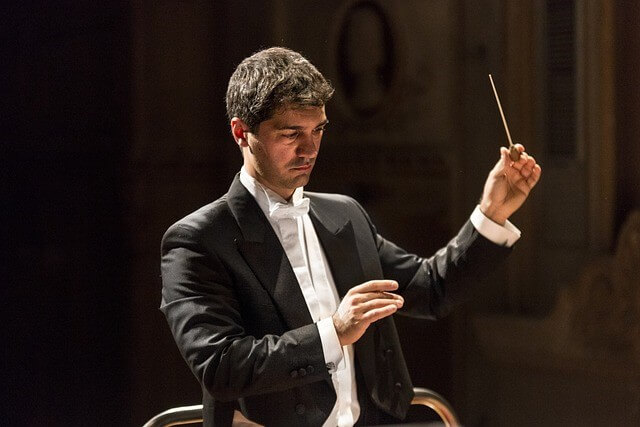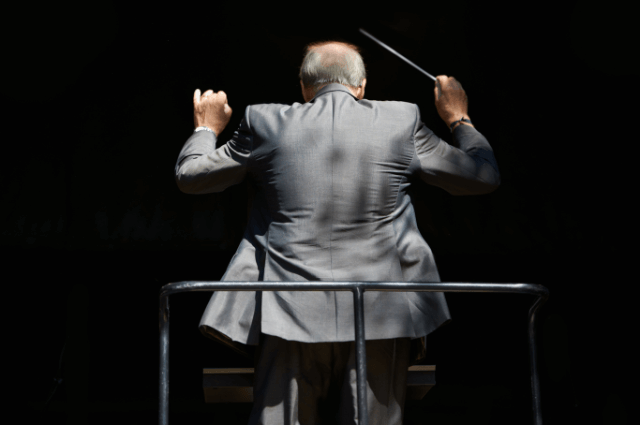Music has the power to invoke emotion, speak to our souls, and bring us together. An essential part of this is the conductor – a master musician tasked with leading an orchestra to create beautiful music.
In this blog post, we take a look at the diverse roles and responsibilities of conductors in orchestras.
We will explore how they use their knowledge of music theory, skill in interpreting scores, and great acumen for details to ensure musicians are playing with interpretation, emotion, accuracy, precision and balance.
So let’s dive into examining the role and importance of conductors in orchestras!
What is an Orchestra Conductor?
An orchestra conductor is a person who directs the musicians in an orchestra and guides them to create music.
The conductor is responsible for setting the tempo, communicating instructions to musicians, and ensuring that each instrument can be heard within the overall sound.
They also provide insight into how best to interpret a piece, coach and guide their musicians during rehearsals and performances, and ensure that all musical elements are balanced appropriately in order to produce a desired sonic effect.
In addition, conductors must be familiar with a wide range of musical styles and instruments, have excellent musical memory, and possess strong organizational skills.
What is the role of an Orchestra Conductor?

The role of an orchestra conductor is to lead the players and guide their performance, while also interpreting the music in order to bring out its fullest potential.
Conductors are responsible for setting the tempo and ensuring that each instrument can be heard within the overall sound.
They must also give clear cues to musicians for when to start and stop playing, as well as manage transitions between different musical sections.
Additionally, conductors serve as mentors for their musicians, providing insight into how best to interpret a piece, coaching them through rehearsals and performances, and helping them create a cohesive ensemble sound.
How do Orchestra Conductors help bring out the best in their musicians?
Orchestra Conductors help bring out the best in their musicians through a combination of careful preparation, effective communication, and inspiring leadership.
Preparation involves researching and performing a piece thoroughly so that it can be properly communicated to the orchestra members.
Effective communication includes having a strong presence on stage and conveying clear directions to the musicians.
Inspiring leadership involves having passion and enthusiasm for the music as well as motivating the group to strive for excellence.
What skills and qualities make a great Orchestra Conductor?
Great Orchestra Conductors possess a range of technical and interpersonal skills that enable them to be effective communicators and leaders.
They have a thorough knowledge of music, including theory, notation, and interpretation as it applies to orchestral works in various genres. They are able to read scores quickly and accurately during rehearsals.
Good conductors also have strong conducting techniques such as cueing the ensemble with their hands or baton and using precise verbal commands for greater accuracy.
Lastly, good orchestra conductors have excellent interpersonal skills such as a dynamic presence on stage, the ability to engage with the musicians in a positive way, and an inspirational demeanor that motivates the whole orchestra to work together towards achieving excellence.
What challenges do Orchestra Conductors face while leading an ensemble?
Orchestra Conductors face a range of challenges while leading an ensemble, from navigating the different personalities and abilities of their musicians to making sure that everyone is following the same musical interpretation.
Conductors must strive to bring out the best in each musician and ensure that all players are comfortable with their individual contributions.
The conductor must also be able to interpret the composer’s intended emotion within a piece, as well as handle any difficult dynamic or rhythmic passages.
Lastly, conductors must be able to work under pressure without losing focus or enthusiasm during rehearsals or performances.
What are the best current Orchestra Conductors?
Some of the best current Orchestra Conductors include Gustavo Dudamel, Esa-Pekka Salonen, Valery Gergiev, Marin Alsop, and Alan Gilbert. Each conductor has a unique style and ability to bring out the best in their musicians.
They have conducted some of the world’s great ensembles such as the Los Angeles Philharmonic, the London Symphony Orchestra, and the Berlin Philharmonic.
Their musical interpretations are highly regarded and they have a presence capable of engaging entire orchestras.
Conclusions
It is clear that the conductor plays a vital role in the success and artistry of an orchestra. A conductor’s skill, leadership and personality can inspire a group of talented musicians to create beautiful music.
The best current conductors demonstrate their abilities to bring out the best in their ensembles through successful performances with world renowned orchestras.
Their engagement with both the audience and orchestral members helps foster a sense of community that allows for more powerful artistic expression.
It can be argued that in many ways, a conductor is just as responsible for the quality of an orchestra’s performance as its individual players.



